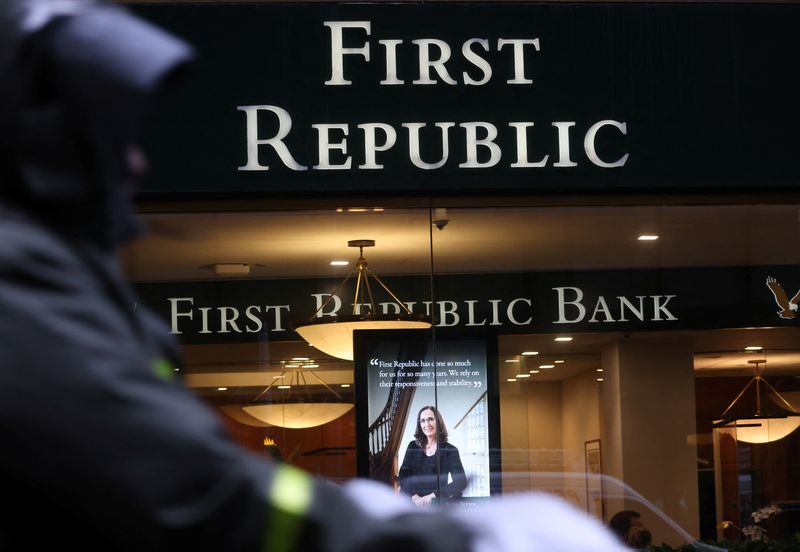NEW YORK (Reuters) - First Republic Bank (NYSE:FRC) spoke to at least one private equity firm about raising capital before it secured financing from JPMorgan Chase & Co (NYSE:JPM) and U.S. authorities intervened with support for the industry, two sources familiar with the matter said.
The conversations, which have not been previously reported, shed new light on the frenzied activity that took place over the weekend after the collapse of Silicon Valley Bank, as other lenders under pressure looked for ways to restore investor confidence.
First Republic had various approaches and ideas put to it, a third source familiar with the matter said, adding that private equity firms have capital to deploy and were looking for opportunities.
They added that the private equity deal talks ended once First Republic announced its credit line with JPMorgan.
First Republic was not immediately available for comment.
The approach came prior to the U.S. Federal Reserve and other regulators on Sunday evening announced a series of emergency measures to shore up confidence in the banking system, which took away some of the urgency to do a deal, the sources said.
First Republic said on Sunday night it had secured additional financing through JPMorgan, giving it access to a total of $70 billion in funds through various sources. The additional borrowing capacity from the Fed as well as that from JPMorgan had boosted the amount of liquidity it had available.
JPMorgan did not immediately respond to requests for comment.
Shares of First Republic slumped more than 60% on Monday on fears of bank contagion following the collapse of SVB Financial Group and Signature Bank (NASDAQ:SBNY). SVB had seen flight of deposits, many of which were uninsured. First Republic's shares recovered a part of their losses on Tuesday, rising 27%.
One of the sources said other banks, too, had looked for capital but after the administration's emergency measures on Sunday and a rout in bank stocks the following day, any deals would likely take time.
In some cases, the situation had flipped from banks looking for capital to investors seeking bargains, one of the sources said.
Founded in 1985, First Republic had $212 billion in assets and $176.4 billion in deposits as of the end of last year, according to its annual report.
About 70% of its deposits are uninsured, above the median of 55% for medium-sized banks and the third highest in the group after Silicon Valley Bank and Signature Bank, according to a Bank of America (NYSE:BAC) note.
The White House on Tuesday weighed in, with an official saying it is carefully monitoring developments at First Republic and other smaller banks after actions to protect depositors.
The official said the U.S. banking system was in "a vastly better position right now" than if the actions had not been taken and depositors should have confidence their funds would be protected.
